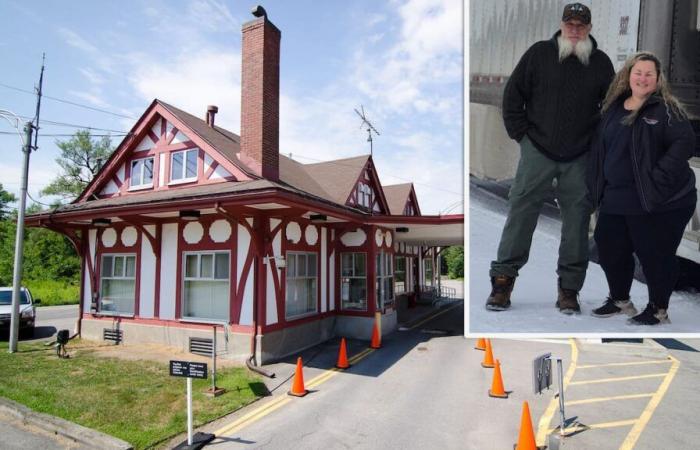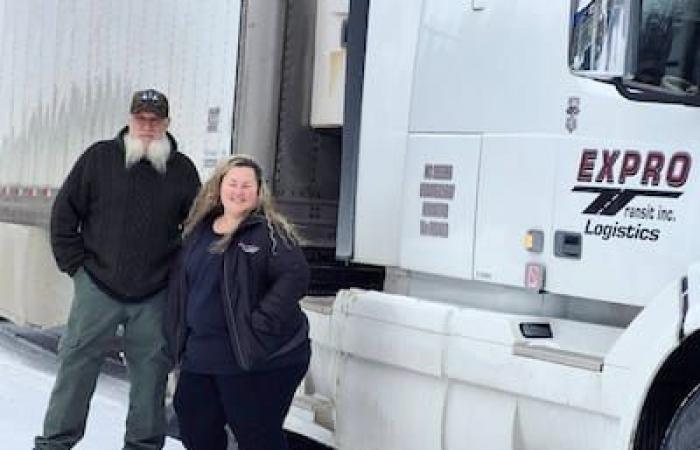The nighttime closure of around ten Quebec border crossings coming into force today worries entrepreneurs and mayors, who fear several consequences, including the slowdown of emergency services.
“I am against that,” summarizes Steve Lanciaux, mayor of Saint-Herménégilde, a municipality in Estrie located on the border with the United States.
From today, the Hereford entry point which leads to his town as well as nine other border crossings will close at night, sometimes as early as 4 p.m. The Canada Border Services Agency (CBSA) announced these changes in November, explaining that resources would be reallocated to busier posts to “strengthen” their capacities.
A barrier and a padlock
But many believe that the government poorly assessed the impacts of its decision, as in Saint-Herménégilde, where half of the territory is served by American emergency services who were counting on a rapid opening of the barrier by the customs officer during interventions.
“They want to put in a barrier system that I find completely ridiculous,” maintains Mr. Lanciaux. There will be a fence with a padlock. The firefighters [par exemple] will have to stop, get out of the vehicle, remove the lock, open the barrier. This is precious time they are going to waste. Every second counts.”
Steve Lanciaux, mayor of Saint-Herménégilde.
Photo taken from STEVE LANCIAUX’S FACEBOOK PAGE
The new timetables are also criticized by the transport company Expro, located in Sainte-Clotilde-de-Châteauguay, in Montérégie.
“It’s going to affect a lot of things,” explains Melanie Booth, company administrator. She argues that her biggest customer is 10 minutes from the Herdman port of entry, but her truckers will now have to make a 1.5-hour detour to the Champlain crossing at night.
PHOTO PROVIDED BY MELANIE BOOTH
“We made 5 to 6 trips per day where we passed through this customs,” explains M.me Booth.
Added to the constraints of maximum working hours for drivers, this generates significant cost increases that Expro is, for the moment, unable to quantify.
Workers concerned
What’s more, many citizens living near the border must frequently cross it, particularly for work, underlines Mark Wallace, mayor of Hinchinbrooke, near the Trout River border crossing, in Montérégie.
“There are probably 40 to 50 people in our town who work on the American side and travel back and forth. Some people will change jobs altogether because they would have to drive two hours longer to go to the next customs office. It’s just not feasible.”
For Mayor Wallace, these changes represent a “disappointment”.
“Those who make this decision do not consider those who are affected on a daily basis,” he laments.
By email, CBSA spokesperson Guillaume Bérubé assured that emergency services would “not be affected”.
“Data indicates that these ports of entry are processing an average of two or fewer commercial cars or trucks per hour during the hours they will no longer be operational. For the majority of these entry points, there is another crossing option within a radius of 25 km or less and, for others, within a radius of 50 km or less,” he said.
New schedules for Quebec border crossings affected by the changes
- Chartierville: from 8 a.m. to 8 p.m.
- Clarenceville: from 8 a.m. to 4 p.m.
- Frelighsburg: from 8 a.m. to 8 p.m.
- Herdman: from 6 a.m. to 6 p.m.
- Hereford Road: from 8 a.m. to 8 p.m.
- Highwater: from 8 a.m. to 8 p.m.
- Lacolle Route 221: from 6 a.m. to 10 p.m.
- Lacolle Route 223: from 8 a.m. to 8 p.m.
- Noyan: from 8 a.m. to 8 p.m.
- Trout River: from 6 a.m. to 6 p.m.







